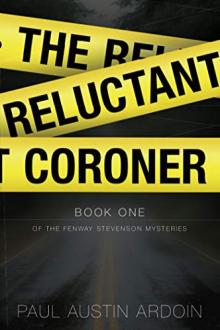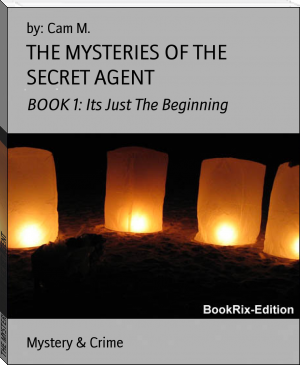The Reluctant Coroner by Paul Austin Ardoin (distant reading txt) 📖

- Author: Paul Austin Ardoin
- Performer: -
Book online «The Reluctant Coroner by Paul Austin Ardoin (distant reading txt) 📖». Author Paul Austin Ardoin
“What?”
“My father offering to move me down here. Of course there’s a catch. What does he want?” She’d at least thought her father would wait a couple of months before revealing the catch. She didn’t expect it dropped on her before she even returned the truck. “Lay it on me, Sheriff.”
McVie’s forehead crinkled and his mouth opened slightly. It was almost adorable, but Fenway was too angry to backtrack.
The server appeared with the coffee pot. “You know what you want?”
Fenway had closed her menu, intending to order a simple two-egg breakfast. But now her day would be spent figuring out her father’s agenda and playing family politics through the sheriff. She opened the menu again and found the priciest item. “I’d like the smoked salmon benedict, please. And—can you add a bowl of fresh fruit?”
“There’s an extra cost,” the server said, pouring coffee into McVie’s cup. “You want it subbed out for the hash browns?”
“No, I’d like both, thanks.”
McVie stared at Fenway a moment.
“And you, Sheriff?”
“I guess I’ll have the number three. Over easy, bacon crisp, sourdough toast.”
They sat in silence for a moment after the server took their menus. Fenway reached for her coffee. “My father gave you all my background, then. Transcripts, criminal record, DMV data, all that stuff. You know when I’m due for my next tetanus shot?”
“We want to appoint you to a county position, and a background check is part of that. It’s routine.”
“I didn’t agree to anything.” She set the coffee down and folded her arms. “You have to know this is a huge breach of privacy. It might not even be legal.”
“Only your public records,” McVie said. “We didn’t even run a credit report.”
“My father hasn’t cared about anything I’ve done for the last twenty years.” She tried to keep the edge out of her voice. “I should have known this is only because he wants something.”
McVie opened his mouth to speak, then suddenly stopped.
“Sheriff, you know everything about me. So tell me, what do I need to know?”
“All right.” McVie took a deep breath. “Okay. The county coroner died suddenly two nights ago.”
“Oh.” Fenway paused for a moment and felt a pang of regret. “I’m sorry. Were you close?”
“We were co-workers. I’d have a beer with Harry after work a few times a year.” The sheriff took a drink of his coffee. “Harrison Walker. Your dad bankrolled his first campaign for county coroner about six years ago.”
“That’s an elected position?”
“In Dominguez County it is.” McVie leaned forward with his elbows on the table. “Late Sunday night, Walker’s body was found face down on the side of Highway 326.” He averted his eyes. “He’d been shot. Close to the entrance of the state park.”
“That’s awful.”
McVie nodded, still not looking at her.
Fenway hesitated but pressed on. “You said you needed my help. I’m a nurse practitioner. What are you asking me to do?”
McVie looked up. “One of my responsibilities as Sheriff is to appoint people to vacant positions. The county coroner position is vacant.” He took another sip of coffee. “The next election is in November. I have to appoint someone now.”
“Doesn’t California have an election in June?”
“The deadline to get on the ballot has passed. We’ve appointed other people to elected positions before—not very often, but it happens.”
“So—what? Based on my nursing background, does my father want me to assess some candidates for you?” She dropped her arms to her sides. “I haven’t done that before, but if it pays well, sign me up.”
“Uh, no. I want… actually… I want to appoint you.”
Fenway blinked. “Me? I don’t have an M.D.”
“You don’t need an M.D. to be a coroner in California. Medical examiner, yes. But not coroner. Harrison Walker was an EMT.”
“Even if I technically meet the requirements, there must be a dozen other people more qualified.”
McVie nodded. “I’ll admit you’re not the first choice. One of the county supervisors has been angling for the position. He lost to Walker in the last election. A few people are planning to run for coroner in November, but none of them can serve immediately.”
“I don’t have any experience at being a coroner.”
“Neither did Harrison Walker.”
“I still have one class to go before I finish my degree.”
“A master’s degree in forensics is not a job requirement. Besides, you’re enrolled online. You can still finish. You’ve got a good five years of medical experience. You’ve been an ER nurse, worked at a free clinic. You can recognize the signs of drug use and domestic abuse. That’s a big part of the job.”
“Don’t I have to cut people up and determine time of death?”
“We work with the M.E. in San Miguelito. The Park Police sent Walker’s body there already. Most of your job is going to be working on drug overdose cases. People who die at home from heart attacks. Falling off ladders putting up their Christmas lights. Any homicide, suicide, accidental death—if it doesn’t happen under medical supervision, your team will investigate it.”
Fenway looked down at the table. County coroner. I guarantee you’ll have a job before you unpack. She was a nurse practitioner. She was good at it. The forensic stuff was so she could help the living, interpreting physical evidence in victims of abuse. “I don’t know.” Fenway raised her head, and McVie’s blue eyes stared into hers. “Why me?”
“Your dad called me up after my first choices went nowhere. He told me your background, he told me you were arriving soon, and he told me you’re in the perfect position to take this full-time job, even if it’s for just six months.”
The server appeared and set the plates in front of them. Fenway picked up her fork and knife. “I guess he has a point. I can’t take a nursing job in California until I pass the boards.”
McVie nodded, picking up his fork, but didn’t start. “I reviewed your job history, your transcripts. I read the recommendation letters from your supervisors and instructors. Your dad knew you were valedictorian at Western Washington, but even he didn’t know you had straight A’s in your master’s program.”
Fenway began eating.
“Look,” he continued, “maybe it seems like your dad is trying to play puppet master. I was skeptical at first, too. But you qualify. And I think you’d do a good job.”
Fenway took another bite.
McVie put down his unused fork. “We don’t have any other options. I can’t leave the position open, and you’re looking for a temporary job. You’ll get a decent salary and benefits. You can finish your master’s. You can apply for certification in California. It’s a win-win, if you ask me.”
Fenway swallowed carefully, then took another sip of coffee and set the mug down.
“What do you think?” His eyes were soft; asking, but not pleading.
“I’m not sure whether to be insulted or flattered.”
“Flattered.” McVie smiled warmly.
She didn’t want to, but she found herself smiling back. It sounded intriguing—she wanted to be angry at her father for so much meddling, but McVie’s frank assessment of her situation was accurate.
And his smile was adorable.
“It sounds like there are a lot of positives. I guess I’d be interested in interviewing.”
He laughed, another genuine laugh. “What do you think this is?”
Fenway laughed in return, but darkness crept into the back of her mind.
This seemed like a win-win, but Nathaniel Ferris didn’t do anything without getting something for himself. The cynical view? He’d suggested her as coroner purely for optics. It wouldn’t look good if his black daughter were to struggle financially while he was so well off. Or, even more cynical, maybe he thought Fenway would look the other way if there were deaths that could be laid at his door.
Better unemployed than dead.
Wrong place, wrong time.
She looked into McVie’s face. Working in the ER, she’d gotten good at telling when people were lying.
Oh, no, I never touch my mom’s Oxy.
I swear I fell down a flight of stairs.
I don’t know why my kids are so sick.
Fenway took another bite of her benedict.
She’d learned how to read the physical evidence. Opioid addiction was hard to mask. Radial fractures were an easy tell. The toxicology reports were tough to read, but she learned what to look for in the kids’ skin when a parent was cooking meth. And her forensic classes taught her things she thought she’d never need—how to take fingerprints, how to work a crime scene, how to talk to witnesses. Maybe those classes would be useful after all.
Yeah. She might be okay at this.
But could she trust her father?
She took another three bites before McVie said anything.
“Are you considering it?”
“I’m walking through the scenarios in my head,” she said. “Do you know—”
And then she stopped. She’d almost asked about the accident at the Ferris Energy refinery. Who had died. What the results of the investigation were.
“Do I know what?” asked McVie.
The sheriff and her
 However, all readers - sooner or later - find for themselves a literary genre that is fundamentally different from all others.
However, all readers - sooner or later - find for themselves a literary genre that is fundamentally different from all others. 




Comments (0)